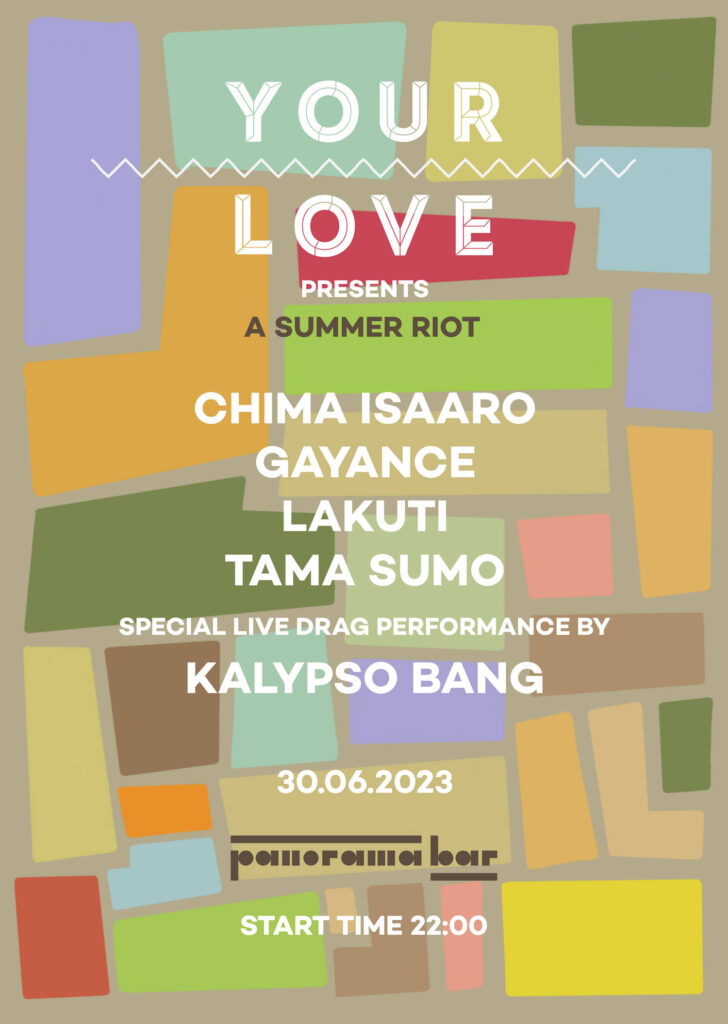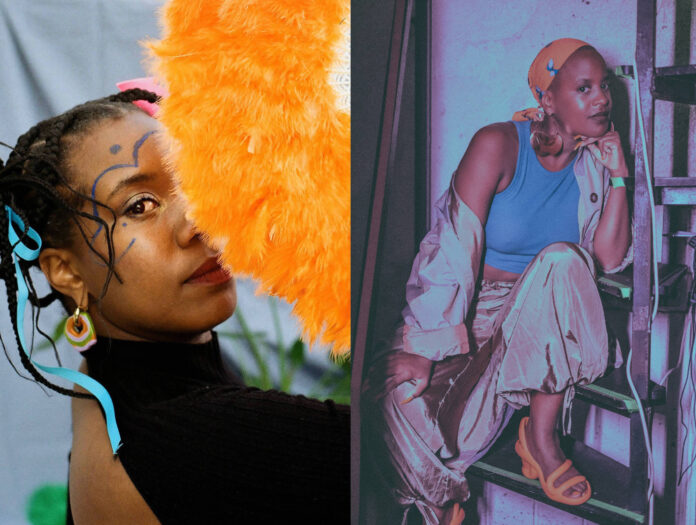On Friday, June 30, the next issue of Lakuti and Tama Sumo’s party series Your Love is happening at Panorama Bar. This time, apart from drag artist Kalypso Bang’s performance and obligatory DJ sets by the hosts of the evening, Gayance and Chima Isaaro will be taking to the decks.
In a short interview, both of them answered some questions to Lakuti and Tama Sumo. Check it out and learn how both of them got into DJing, how relocating changed their perspectives on club culture, and how they got into music early on.
Do you come from musical families? If so, how has that shaped your own creativity?
Gayance: In my family, music was always a tool to bring people together. Whether it was through spirituality or the rave scene. I think music is a tool for unity, solidarity and healing because of what I’ve seen my family doing around me.
Chima Isaaro: Music was always a part of my life. My dad is a musicologist, so I was surrounded by music since before I was born. Although he introduced me mainly to classical music and jazz, his influence was fundamental for me as it made me develop my ability to listen, search and stay curious and open to all kinds of sounds.
When did you both start djing and producing? And in your case, Gayance: What motivated you to embark on this creative path?
Gayance: To be honest, it was just a way to express some deep emotions. I was stuck during the pandemic, alone in a very small apartment in Montreal. Listening to music, dancing to music wasn’t enough to ease my troubles. I had to sing it and create it.
Chima Isaaro: I started djing quite accidentally. I have always been a music geek digging and collecting and was even learning how to play records, but only as a hobby. Although I was constantly encouraged by friends and family to do it, it took me many years to actually believe I could embrace djing as a profession.
Was there are specific moment that changed things for you?
In 2016 I was booked by a friend to Dj at one of his parties. In my mind that was a one time experience so I just accepted the invitation without thinking too much. From then other bookings followed. It was also around the same time that Radio Quântica, a Lisbon based online radio station, offered me the opportunity to have my own show. I accepted the challenge and called my show “Nyce and Slo”. Playing on the radio without any sort of external pressure was a great way for me to explore, learn and gain confidence then–everything happened quite organically.
You are both transplants from one place to another. In your case, Chima, from the Algarve to Lisbon and Gayance from Montreal to Amsterdam. What prompted you to make a move and how has that move influenced your work, if at all?
Gayance: Personally, I like traveling. I would do it–regardless of what I do for a living. I think seeing a place in its daily life set up, getting to know locals and being immersed in how they live, is such a precious human interaction. I feel like I have a good overview on things. I like listening to people’s perspectives and challenging mine and vice versa.
Chima Isaaro: I grew up in Belgium and in Algarve and have been living in Lisbon since 2014. As mentioned, becoming a DJ isn’t something I have planned. When I was in Brussels I used to work at and go to all kinds of parties but never dj’ed or thought of doing it. However, all those years were profoundly inspiring and essential for me to deepen my music knowledge and to prepare me for what I do now.
Lisbon is a small city so I naturally ended up meeting many people who were active in the scene. Some of them really encouraged me to actually start playing. But also, as a huge house music head, one thing that always shook me was that there were almost no black people in the house scene. So as soon as I started Djing, I felt it was important to try to do something to change that. In general, my main focus is to play black music, essentially house and occasionally techno and to challenge these white dominated scenes as well as celebrating the black origins of the genres. So I’d say at that level, being here really had an impact on the definition of my goal and focus.
Are there any upcoming projects you are looking forward to?
Gayance: I can’t wait to play “Your Love” at Panorama bar with all of y’all, that’s for sure! I can’t wait to show a short film I worked on. In the upcoming season, I got booked for Montreux Jazz Festival closing on July 14, Milkshake Festival in Amsterdam, Dekmantel and Lowlands, and I also got longlisted for the Polaris Prize, which is the Canadian version of the Mercury Prize, in the category “Best Canadian Album”. I’m also working on music with interesting collaborators.
Chima Isaaro: I’ve just started my own party Club CCC with CC:DISCO! and DJ Caring–hoping to bring something new, fun, unpretentious and dance focused to the Lisbon scene. I’ve also been producing so hopefully I’ll have more news in the future.

